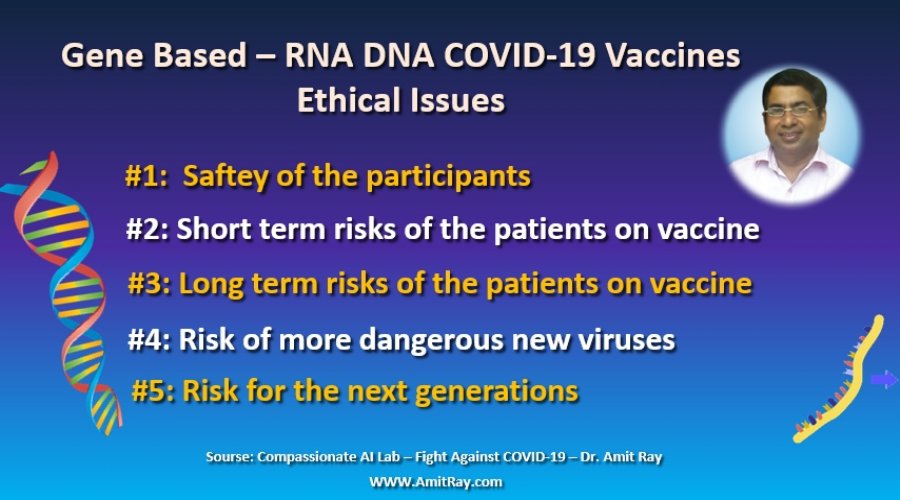Gene-based vaccines make changes to the body’s set of basic instructions; it raises many unique ethical concerns related to COVID 19 Vaccines. Despite the benefits of conventional vaccination, people are worried about risks associated with the use of Gene-based vaccines. We at Compassionate AI Lab navigates into the practical and ethical challenges that come with gene-based vaccination. Scientists should be vigilant about the possible risks so that they can be addressed before problems emerge.
Although labs have created several gene-based vaccines for other viruses, not one has been commercialized for a human illness for several critical reasons. It is time to think hard about how society can deal with the problematic issue of possible long term and rare adverse effects of gene-based vaccination. Moreover, there are several concerns, including the efficacy, safety, and ethics of conducting gene-based clinical trials in developing countries.

1. COVID 19 Vaccine Development: An Overview
The first vaccine was developed more than 200 years ago; vaccinations have significantly decreased the burden of infectious diseases worldwide. Conventional vaccination is one of the major success stories of medical science. There are eight classes of COVID 19 Vaccines. Life cycle of the COVID 19 virus has its impact on vaccine development.
Conventional vaccines usually contain inactivated disease-causing organisms or proteins made by the pathogen (antigens), which work by mimicking the infectious agent. They stimulate the body’s immune response, so it is primed to respond more rapidly and effectively if exposed to the infectious agent in the future.
Gene-based vaccines are genetically modified organisms and are therefore considered a potential risk to human health and environment associated with the release of these organisms.
Conventional vaccines, developed by attenuating or inactivating the respective pathogen, have successfully decreased the burden of several infectious diseases in the past, leading to the eradication of smallpox and significantly restricting diseases such as polio, tetanus, diphtheria, and measles.
2. DNA Based Vaccines
DNA vaccines contain DNA that codes for specific proteins from a pathogen (antigens). The DNA is injected into the body and taken up by cells, whose normal metabolic processes synthesize proteins based on the genetic code in the plasmid that they have taken up. Research on DNA vaccines has started as early as the 1990s. DNA vaccines to cross two cellular membranes, i.e., the plasma, as well as the nuclear membrane, to achieve protein expression.
Various preclinical studies that demonstrated the presence of plasmid DNA for up to 2 years upon IM injection with low but detectable expression and immunogenicity in a mouse model. Especially in the context of this long-term persistence, the presence of foreign genetic information in the nucleus of transfected cells poses the additional risk of genomic integration into the host’s chromosomes and the resulting threat of mutagenesis and oncogenesis.
No DNA based vaccine is licensed for human use as yet, but several DNA based vaccines have been licensed for veterinary applications, such as an equine vaccine against West Nile Virus.
3. RNA Based Vaccines
RNA vaccines work by introducing an mRNA sequence (the molecule, which tells, cells what to build) which is coded for a disease-specific antigen, once produced within the body; the antigen is recognized by the immune system, preparing it to fight the real viruses.
RNA vaccines can be delivered using several methods: via needle-syringe injections or needle-free into the skin; via injection into the blood, muscle, lymph node or directly into organs. The optimal route for vaccine delivery is not yet known. There are two major types of RNA vaccines: Non-replicating mRNA vaccines and Self-amplifying mRNA.
Their inability for genomic integration and lack of persistence in the cells of the vaccine offers essential advantages in terms of vaccine safety. However, since RNA vaccines represent the most recently developed technology described here, their use in humans is less well characterized than for viral vector or DNA based vaccines.
4. Critical Ethical Issues for COVID 19 Vaccines
SARS-CoV-2 challenge studies may (at present) be thought to involve higher levels of risk and uncertainty than other commonly accepted human challenge studies because the pathogenesis of COVID-19 is currently poorly understood. The safety of participants is a necessary critical condition for the ethical acceptability of human challenge studies. Several critical ethical issues for COVID 19 vaccines.
5. Safety of the Clinical Trial Participants
The ongoing safety of clinical trial participants is one of the most vital concern. Developing countries represent the majority of the world’s population. A recent review indicated that about one-third of 509 clinical trials sponsored by US-based companies from 1995 to 2005 were conducted outside the USA, many in poor and low-income countries, without targeting diseases prevalent in these countries. Often trials in developing countries are identified in which some or all of the participants are not being provided with protective drugs and caring. Often ethics for medical research upon uneducated human subjects in the developing countries are compromised.
Presently, clinical trial participants are exploited on many fronts, to safeguard their rights; the clinical trial participants must enjoy the profit from the drug or the vaccines lifelong.
6. Safety of the Clinical Trial Patients
The new vaccine may cause serious side effects or be uncomfortable. The clinical trial could inconvenience to the patients. For example, medical appointments could take a lot of time. The patient might need to travel to the study site several times or stay in the hospital. The patient may NOT be part of the treatment group (or experimental group) that gets the new treatment. Instead, the patient may be part of the control group, which means they may not get any treatment.
Just informed consent process may not protect participants. They should be empowered with information, recognition and lifelong monetary benefits. They must enjoy the profit from the drug or the vaccines lifelong.
7. Short Term Risks of Gene-based Vaccine
Expression of cytokines or co-stimulatory molecules that are used to enhance DNA immunogenicity might lead to unintended adverse effects upon cytokine expression and releases such as generalized immune suppression, chronic inflammation or autoimmunity. Some adverse effects become known only years after the development, marketing, and registration of the vaccine.
8. Long Term Risks of the Gene-based Vaccine
There is limited research on the effects of these DNA RNA vaccines on humans since most tests have only been conducted on lab animals. Potential side effects could include chronic inflammation because the vaccine continuously stimulates the immune system to produce antibodies. Other concerns include the possible integration of plasmid DNA into the body’s host genome, resulting in mutations, problems with DNA replication, triggering of autoimmune responses, and activation of cancer-causing genes.
9. Possibility of Creating More Dangerous Viruses
One response of viruses to vaccines involves the evolution of viral proteins that allow them to escape the vaccine, which is known as “epitope evolution”. Even if a vaccine is effective in preventing a particular strain of the virus, other strains may take its place. The interaction between viruses and their targets can change over time.
So far, scientists across the world have identified over 200 genetic mutations in the SARS-CoV-2 that causes COVID-19. Researchers identified 14 mutations in the Spike protein. The researchers have proposed increased transmissibility of the virus due to the mutation. Generally, mutations do not translate into a more dangerous virus. But gene-based vaccines can accelerate the mutations and produce dangerous viruses.
10. Effect on the Next Generations
Gene-based vaccines are open-ended therapy. Its effects extend indefinitely into the future. But precisely there lies also an ethical problem: an experiment in gene-based vaccines would be equivalent to a clinical trial on unconsenting subjects, which are the affected members of future generations.
The term genetic diseases are no longer restricted to diseases like Huntington’s, Phenylketonuria (PKU), or Sickle-cell anaemia that are the result of a defect in a single locus and have 100% heritably. Instead, the genetic disease has been expanded to include any trait that has a genetic component even though the heritably is reduced. As a result, cardiovascular disease, some types of cancer and diabetes are now considered to be genetic diseases. There is a chance that the gene-based vaccines may have an adverse effect on the next generations.
Conclusion
It is clear that gene-based vaccine holds some promise but there is significant potential for misuse. The short-term and long-term safety, security of the clinical trial participants and patients must be ensured. The hype about gene-based vaccines has not been thoroughly evaluated. Much more work is required before researchers can obtain more precise estimates of their benefits and risks.
Download: Gene Based Covid 19 Vaccines Ethical Issues by Dr. Amit Ray
References:
- Tom Jefferson, Vaccination and its adverse effects: real or perceived, BMJ
- Andrew F. Read, et al., Imperfect Vaccination Can Enhance the Transmission of Highly Virulent Pathogens, POLS Biology.
- Rauch Susanne, New Vaccine Technologies to Combat Outbreak Situations, Frontiers in Immunology.
- John Barthelow Classen, Public should be told that vaccines may have long term adverse effects, BMJ
- Angela S Clem, Fundamentals of Vaccine Immunology, Journal of Global Infectious Diseases.
